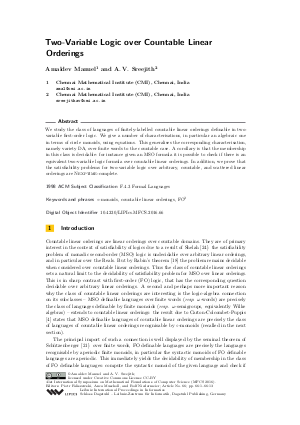Two-Variable Logic over Countable Linear Orderings
Authors Amaldev Manuel, A. V. Sreejith
-
Part of:
Volume:
41st International Symposium on Mathematical Foundations of Computer Science (MFCS 2016)
Part of: Series: Leibniz International Proceedings in Informatics (LIPIcs)
Part of: Conference: Mathematical Foundations of Computer Science (MFCS) - License:
 Creative Commons Attribution 3.0 Unported license
Creative Commons Attribution 3.0 Unported license
- Publication Date: 2016-08-19
File

PDF
LIPIcs.MFCS.2016.66.pdf
- Filesize: 446 kB
- 13 pages
Document Identifiers
Subject Classification
Keywords
- circ-monoids
- countable linear orderings
- FO^2
Metrics
- Access Statistics
-
Total Accesses (updated on a weekly basis)
0Document
0Metadata
Abstract
We study the class of languages of finitely-labelled countable linear orderings definable in two-variable first-order logic. We give a number of characterisations, in particular an algebraic one in terms of circle monoids, using equations. This generalises the corresponding characterisation, namely variety DA, over finite words to the countable case. A corollary is that the membership in this class is decidable: for instance given an MSO formula it is possible to check if there is an equivalent two-variable logic formula over countable linear orderings. In addition, we prove that the satisfiability problems for two-variable logic over arbitrary, countable, and scattered linear orderings are NEXPTIME-complete.
Cite As Get BibTex
Amaldev Manuel and A. V. Sreejith. Two-Variable Logic over Countable Linear Orderings. In 41st International Symposium on Mathematical Foundations of Computer Science (MFCS 2016). Leibniz International Proceedings in Informatics (LIPIcs), Volume 58, pp. 66:1-66:13, Schloss Dagstuhl – Leibniz-Zentrum für Informatik (2016)
https://doi.org/10.4230/LIPIcs.MFCS.2016.66
BibTex
@InProceedings{manuel_et_al:LIPIcs.MFCS.2016.66,
author = {Manuel, Amaldev and Sreejith, A. V.},
title = {{Two-Variable Logic over Countable Linear Orderings}},
booktitle = {41st International Symposium on Mathematical Foundations of Computer Science (MFCS 2016)},
pages = {66:1--66:13},
series = {Leibniz International Proceedings in Informatics (LIPIcs)},
ISBN = {978-3-95977-016-3},
ISSN = {1868-8969},
year = {2016},
volume = {58},
editor = {Faliszewski, Piotr and Muscholl, Anca and Niedermeier, Rolf},
publisher = {Schloss Dagstuhl -- Leibniz-Zentrum f{\"u}r Informatik},
address = {Dagstuhl, Germany},
URL = {https://drops.dagstuhl.de/entities/document/10.4230/LIPIcs.MFCS.2016.66},
URN = {urn:nbn:de:0030-drops-64788},
doi = {10.4230/LIPIcs.MFCS.2016.66},
annote = {Keywords: circ-monoids, countable linear orderings, FO^2}
}
Author Details
References
-
Nicolas Bedon, Alexis Bès, Olivier Carton, and Chloe Rispal. Logic and rational languages of words indexed by linear orderings. Theory Comput. Syst., 46(4):737-760, 2010.

-
Alexis Bès and Olivier Carton. Algebraic characterization of FO for scattered linear orderings. In Computer Science Logic, 25th International Workshop / 20th Annual Conference of the EACSL, CSL 2011, pages 67-81, 2011.

-
Mikołaj Bojańczyk, Claire David, Anca Muscholl, Thomas Schwentick, and Luc Segoufin. Two-variable logic on data words. ACM Trans. Comput. Log., 12(4):27, 2011.

-
Olivier Carton, Thomas Colcombet, and Gabriele Puppis. Regular languages of words over countable linear orderings. In Automata, Languages and Programming - 38th International Colloquium, ICALP 2011, Proceedings, Part II, pages 125-136, 2011.

-
Thomas Colcombet. Factorization forests for infinite words and applications to countable scattered linear orderings. Theor. Comput. Sci., 411(4-5):751-764, 2010.

-
Thomas Colcombet and A. V. Sreejith. Limited set quantifiers over countable linear orderings. In Automata, Languages, and Programming - 42nd International Colloquium, ICALP 2015, Proceedings, Part II, pages 146-158, 2015.

-
Julien Cristau. Automata and temporal logic over arbitrary linear time. In IARCS Annual Conference on Foundations of Software Technology and Theoretical Computer Science, FSTTCS 2009, pages 133-144, 2009.

-
Kousha Etessami, Moshe Y. Vardi, and Thomas Wilke. First-order logic with two variables and unary temporal logic. Inf. Comput., 179(2):279-295, 2002.

-
Martin Fürer. The computational complexity of the unconstrained limited domino problem (with implications for logical decision problems). In Logic and Machines: Decision Problems and Complexity, Proceedings of Symposium Rekursive Kombinatorik, pages 312-319, 1983.

-
Erich Grädel, Phokion G. Kolaitis, and Moshe Y. Vardi. On the decision problem for two-variable first-order logic. Bulletin of Symbolic Logic, 3(1):53-69, 1997.

-
Manfred Kufleitner and Pascal Weil. On FO2 quantifier alternation over words. In Mathematical Foundations of Computer Science 2009, 34th International Symposium, MFCS 2009, pages 513-524, 2009.

-
Manfred Kufleitner and Pascal Weil. The FO2 alternation hierarchy is decidable. In Computer Science Logic (CSL'12) - 26th International Workshop/21st Annual Conference of the EACSL, CSL 2012, pages 426-439, 2012.

-
Amaldev Manuel. Two variables and two successors. In Mathematical Foundations of Computer Science 2010, 35th International Symposium, MFCS, pages 513-524, 2010.

-
Amaldev Manuel and Thomas Zeume. Two-variable logic on 2-dimensional structures. In Computer Science Logic 2013 (CSL 2013), CSL, pages 484-499, 2013.

-
Martin Otto. Two variable first-order logic over ordered domains. J. Symb. Log., 66(2):685-702, 2001.

-
Jean-Éric Pin. Mathematical foundations of automata theory.

-
Jean-Eric Pin and Pascal Weil. Polynomial closure and unambiguous product. In Automata, Languages and Programming, 22nd International Colloquium, ICALP95, Proceedings, pages 348-359, 1995.

-
Michael O. Rabin. Decidability of second-order theories and automata on infinite trees. Transactions of the American Mathematical Society, 141:1-35, 1969.

-
Alexander Rabinovich. Temporal logics over linear time domains are in PSPACE. Inf. Comput., 210:40-67, 2012.

-
Joseph G. Rosenstein. Linear orderings. Academic Press New York, 1981.

-
Marcel Paul Schützenberger. On finite monoids having only trivial subgroups. Information and Control, 8:190-194, 1965.

-
Thomas Schwentick, Denis Thérien, and Heribert Vollmer. Partially-ordered two-way automata: A new characterization of DA. In Developments in Language Theory, 5th International Conference, DLT 2001, pages 239-250, 2001.

-
Thomas Schwentick and Thomas Zeume. Two-variable logic with two order relations. Logical Methods in Computer Science, 8(1), 2012.

-
S.Shelah. The monadic theory of order. Ann. of Math., 102:379-419, 1975.

-
Pascal Tesson and Denis Therien. Diamonds are forever: The variety DA. In Semigroups, Algorithms, Automata and Languages, pages 475-500. World Scientific, 2002.

-
Denis Thérien and Thomas Wilke. Over words, two variables are as powerful as one quantifier alternation. In Proceedings of the Thirtieth Annual ACM Symposium on Theory of Computing, STOC'98, pages 234-240. ACM, 1998.

-
Philipp Weis and Neil Immerman. Structure theorem and strict alternation hierarchy for FO^2 on words. Logical Methods in Computer Science, 5(3), 2009.

